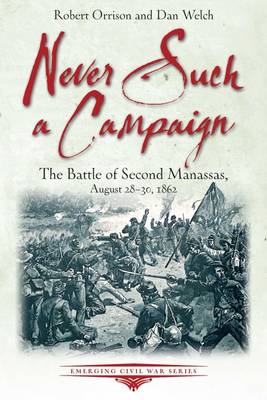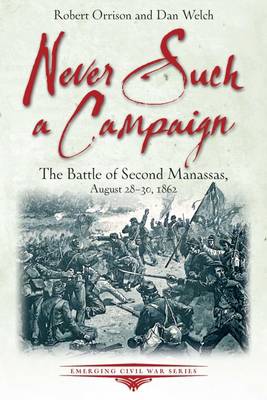
Je cadeautjes zeker op tijd in huis hebben voor de feestdagen? Kom langs in onze winkels en vind het perfecte geschenk!
- Afhalen na 1 uur in een winkel met voorraad
- Gratis thuislevering in België vanaf € 30
- Ruim aanbod met 7 miljoen producten
Je cadeautjes zeker op tijd in huis hebben voor de feestdagen? Kom langs in onze winkels en vind het perfecte geschenk!
- Afhalen na 1 uur in een winkel met voorraad
- Gratis thuislevering in België vanaf € 30
- Ruim aanbod met 7 miljoen producten
Zoeken
Never Such a Campaign
The Battle of Second Manassas, August 28-August 30, 1862
Dan Welch, Kevin R Pawlak
€ 18,45
+ 36 punten
Omschrijving
Historians Robert Orrison and Dan Welch follow Lee and Pope as they converge on ground once-bloodied just thirteen months earlier.
In late June 1862, Gen. Robert E. Lee's Army of Northern Virginia drove back Maj. Gen. George McClellan's Army of the Potomac from the gates of the Confederate capital. Richmond was safe--at least for the moment.
Another threat soon emerged when the Army of Virginia, a new command under Maj. Gen. John Pope, moved toward Fredericksburg, threatening Confederate communications, supply points, and Richmond. Pope, who had a reputation as something of a braggart, had scored victories along the Mississippi River at New Madrid and Island No. 10. President Lincoln was hopeful he would replicate that success in Virginia. Pope brought with him a harder philosophy of war, one that would put pressure not just on Lee's army but on the population of Virginia. Alarmed and offended by "such a miscreant as Pope," Lee began moving part of his army north to counter and "suppress" the threat.
In Never Such a Campaign: The Battle of Second Manassas, August 28-30, 1862, historians Dan Welch and Kevin R. Pawlak follow Lee and Pope as they converge on ground bloodied just thirteen months earlier at First Bull Run (Manassas). Since then, the armies had grown in both size and efficiency, and any pitched combat between them promised to dwarf the earlier battle. For the second summer in a row, Union and Confederate forces clashed on the plains of Manassas. This time, the results would be far more terrible.
In late June 1862, Gen. Robert E. Lee's Army of Northern Virginia drove back Maj. Gen. George McClellan's Army of the Potomac from the gates of the Confederate capital. Richmond was safe--at least for the moment.
Another threat soon emerged when the Army of Virginia, a new command under Maj. Gen. John Pope, moved toward Fredericksburg, threatening Confederate communications, supply points, and Richmond. Pope, who had a reputation as something of a braggart, had scored victories along the Mississippi River at New Madrid and Island No. 10. President Lincoln was hopeful he would replicate that success in Virginia. Pope brought with him a harder philosophy of war, one that would put pressure not just on Lee's army but on the population of Virginia. Alarmed and offended by "such a miscreant as Pope," Lee began moving part of his army north to counter and "suppress" the threat.
In Never Such a Campaign: The Battle of Second Manassas, August 28-30, 1862, historians Dan Welch and Kevin R. Pawlak follow Lee and Pope as they converge on ground bloodied just thirteen months earlier at First Bull Run (Manassas). Since then, the armies had grown in both size and efficiency, and any pitched combat between them promised to dwarf the earlier battle. For the second summer in a row, Union and Confederate forces clashed on the plains of Manassas. This time, the results would be far more terrible.
Specificaties
Betrokkenen
- Auteur(s):
- Uitgeverij:
Inhoud
- Aantal bladzijden:
- 192
- Taal:
- Engels
- Reeks:
Eigenschappen
- Productcode (EAN):
- 9781611216417
- Verschijningsdatum:
- 25/01/2024
- Uitvoering:
- Paperback
- Formaat:
- Trade paperback (VS)
- Afmetingen:
- 150 mm x 226 mm
- Gewicht:
- 299 g

Alleen bij Standaard Boekhandel
+ 36 punten op je klantenkaart van Standaard Boekhandel
Beoordelingen
We publiceren alleen reviews die voldoen aan de voorwaarden voor reviews. Bekijk onze voorwaarden voor reviews.









